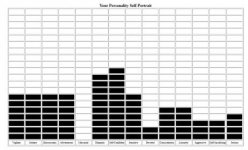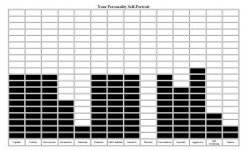Sensitive types prefer the known to the unknown. They are comfortable with habit, repetition, and routine. They care deeply about what other people think and behave with deliberate discretion in their dealings with others. They do not make hasty judgments or jump in before they know what is appropriate. They maintain a courteous, self-restrained demeanor. They function best in scripted settings where they know precisely what is expected of them. Sensitive men and women are not quick to share their innermost thoughts and feelings with others, even those they know well.
Sensitive people are private and territorial. They're nesters, bonding closely with family and coworkers and forming lasting friendships with a favored few. Among strangers, however, they rarely feel themselves. Even well into new relationships, they may find it difficult to be who they are. Yet they can operate impressively when they know exactly what is expected of them. For example, many journalists with Sensitive style can interview celebrities forcefully and effectively, yet experience difficulty talking to such individuals if they are introduced socially.
Some highly Sensitive people are prone to fears and phobias. Others feel anxious, tense, or vaguely uneasy until they can get back to their familiar habits or roles. Uncomfortable or not, they can maintain a polite reserve around strangers and may come off as rather cool. This effectively masks their anxieties but often makes them seem haughty and unapproachable.
They are quite free in their imaginations and are often capable of great inventiveness and creativity. They can occupy themselves quite comfortably when alone, as long as they have a family, partner, or close friends with whom they know they will soon see.
They thrive at work, especially in structured settings. They're thorough, dedicated, competent, and loyal to coworkers and try hard to earn respect.
Stress for this personality style comes from having to brave the unfamiliar on their own. Although some react by restricting their worlds and limiting their risks, many adapt by relying on close companions to accompany or protect them. Others respond by becoming counterphobic--attempting to conquer the anxiety by confronting the challenge again and again. Criticism also causes stress for the Sensitive person. They care greatly about how people react to them, although their reserve might prevent others from realizing this.
Conscientious individuals are dedicated to work and are capable of immense, single-minded effort. They have strong moral principles and values. Opinions and beliefs are rarely held lightly, and they stick to their convictions. Everything must be done 'right,' and the Conscientious person has a clear understanding of what that means, from the best strategy to achieve the boss's objectives, to how to get every single dirty dish into the dishwasher. They like order and tidiness and are good organizers, catalogers, and list-makers. Thrifty, careful, and cautious, Conscientious individuals do not give in to reckless abandon or wild excess. They have a tendency to collect things and are reluctant to discard anything.
Conscientious types believe strongly in hard work and loyalty. Their work is central to their lives. Whenever they commit to a task, they do the job completely and thoroughly. They are the 'A' students in school and the achievers in society. Detail and order are the main priorities of the Conscientious person.
They like things done a certain way and have difficulty adjusting to change. When a problem arises, they work tirelessly until it is solved. They can be paralyzed by the lack of a perfect solution, however. Their drive for perfection and their fear of making mistakes can become a burden. People who are extremely Conscientious have difficulty making decisions and completing their work on time. They require encouragement to delegate tasks, which they tend to avoid since they prefer to do things their own way.
Conscientious people do not display their emotions and can seem dry and lacking in spontaneity. They're 'head' people rather than 'heart' people. They are not without emotion inwardly, however, and often are attracted to partners who are openly emotional (e.g., Dramatic individuals). Their lack of emotion can be problematic in their relationships. The partner often mistakenly believes that the Conscientious person, who can't easily say 'I love you,' is without feeling. Conscientious people make excellent partners, however--they are not quitters and are extremely loyal.
This is a high-stress personality style prone to Type A health risks when extreme. For all their enviable self-control and direction, many Conscientious people find it difficult to relax and experience pleasure.
Serious types are solemn and not given to emotional expression. They are realistically aware of their own capabilities but they are also aware of their limitations. They are not tempted by vanity or self-importance. They hold themselves responsible for their actions. They=re thinkers, analyzers, evaluators, ruminators and will always play things over in their minds before they acting.
Serious individuals anticipate problems and when the worst happens, they=re prepared to deal with it. Serious individuals are realists. They see the hard, harsh nature of life clearly. They have no illusions and are incapable of imagining a silver lining. They are no-nonsense people particularly suited to hard times, when their ability to push on can help everyone to survive. They always work hard and provide for others without any sense of heroism or pride in their efforts.
Even though they can seem joyless, Serious types are not necessarily unhappy. They take great satisfaction in their view of the universe. They are interested in serious subjects, which they find reassuring, and they find no need to escape into pleasure. Serious people are intensely hard workers, dependable, and trustworthy. They persevere whether or not they are enthusiastic or well rewarded. This can make it all too easy for employers to take advantage of them. They do not expect encouragement or to be treated well by others.
Although they are not socially outgoing, once they do connect with others they form very stable, long-term attachments. They tolerate the rough spots in relationships well. They are as critical of others as they are of themselves, but their fault-finding gives them no pleasure. They deeply regret causing any pain . Others who continually insist that they change into optimistic outgoing, happy-go-lucky people cause them great stress but their characteristic cynicism helps them to cope.
...
In other words, I am a rock.



